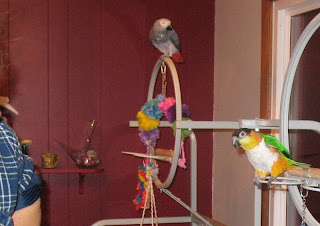I'm not sure how representative my caiques are -- they're the only two that have ever been surrendered to the rescue where I volunteer, so they're the only ones I've spent significant time around.
Calypso was 9 when we adopted him in 2004. He's now 15 years old. For his first few Decembers with us, I could not handle him as when I'd approach he'd do his freak-out and I understood his body language well enough to know that if I persisted, I'd get bit. Then, one day in late December/early January, it's like a flip was switched and I'd have my loving caique back. For the past several Decembers, he has remained tame to me, but ramped up his aggression against Beeps.
Beeps was 8 when we adopted him in 2006; he's now 12. He is pretty much a hormonal mess right now. He gets triggered by pretty much everything, which means he is frequently launching a flying attack on Thomas. Luckily for me, he will rarely try to attack me. However, this does mean that he's spending a bit more time in his cage to calm down.
Here's Beeps, on his launching pad, about to take off after Thomas:
 One great thing about my caiques is that they maintain their very expressive body language even while their bodies are ravaged by hormones. It is very clear when they shouldn't be handled. They are also very good at following directions. If Beeps is worked up and going to attack, we just tell him to go in his cage, and he flies over and climbs inside. So we are able to have him move around without risking a bite. Also, he usually tries to celebrate for a bit before a bite, giving us a couple of extra seconds to remove him from us before biting should he manage to land on one of us with ill intent.
One great thing about my caiques is that they maintain their very expressive body language even while their bodies are ravaged by hormones. It is very clear when they shouldn't be handled. They are also very good at following directions. If Beeps is worked up and going to attack, we just tell him to go in his cage, and he flies over and climbs inside. So we are able to have him move around without risking a bite. Also, he usually tries to celebrate for a bit before a bite, giving us a couple of extra seconds to remove him from us before biting should he manage to land on one of us with ill intent.I feel for these guys when their hormones are raging. They are wild animals that shouldn't be in captivity. They're just trying to do what they've evolved to do, and confused because their living conditions are so different from what they should be in the wild. We have compassion for them, but are very careful not to reinforce behaviors that might continue on after their hormonal impulses have abated.
Typically, these periods last about a month around December, with some lesser amounts in the spring.







0 comments :
Post a Comment